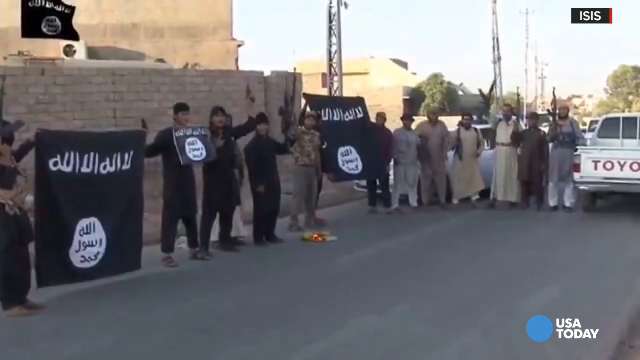
Terrorist recruiters are actively targeting Americans. According to the FBI, at least 100 people from the United States have been recruited by ISIS. VPC
"That's something we are looking into," Kyle Loven, division counsel for the FBI in Minneapolis, said when asked about Abdirahmaan Muhumed, 29, who Fox News reported was killed in the same battle as another American from the Twin Cities area. Earlier this week, the State Department confirmed that Douglas McAuthur McCain died fighting with the Islamic State.
"We're aware of media reporting and social-media activity that a second American citizen has been killed in Syria. We don't have any details to confirm," State Department spokeswoman Jen Psaki said Thursday about Muhumed.
The FBI is also urgently trying to determine if there are Islamic State members on the ground in Minneapolis seeking to recruit men to join the militants in Iraq and Syria.
"If there are (recruiters) on the ground here ... we want to hold these people to account," Loven said.
In recent years, the office has made several arrests of people suspected of recruiting about two dozen young Somali-Americans to travel to Somalia to fight for Al Shabaab, an al-Qaeda affiliate. At least three of those recruits died while carrying out suicide bombings targeting African Union troops in Somalia in 2009 and 2011.
While those travelers had family connections to Somalia, the new crop has no such connection to Syria, Loven said.
With its flashy propaganda videos and growing presence on social media, the Islamic State has been able to recruit at least 100 people from the United States, including some Minnesotans.
"We have been privy to some videos which have directly targeted youths here in Minneapolis, and the quality of the videos have improved extensively," Loven said.
Loven said the targeted messages are working: An estimated 20-25 Minnesotans left to fight for Al Shabaab, and a handful have left to join the Islamic State, including McCain.
FBI agents are trying to understand the logistics of how those recruited are traveling abroad and being funded, Loven said, and talking to community members to determine who is most susceptible to such radicalization.
"Typically, travelers seem to be disaffected, isolated, withdrawn," he said. "So we're asking for assistance within the (Somali) community to identify those who may have those characteristics and may be most vulnerable to the messaging of radicalization."
Thousands of foreign fighters from at least 50 countries have traveled to fight in Syria, according to State Department. Islamic State militants have attracted fighters from at least two dozen countries, according to terrorism experts.
While Jihadist propaganda plays a role, the Somali refugee community in the Twin Cities has been especially vulnerable to radical recruitment.
That's in part because of difficulties experienced by Somalis who were pushed out of their country with little of the preparation of typical immigrants, and who sometimes find themselves unable to adapt, and with access to radical ideologies, says Ahmed Samatar, a Somali-American professor of international political economics at Macalester College in St. Paul.
Most Somali-Americans are concerned with day-to-day life, their careers and their children's welfare, but "there are those who might slip and find it difficult and alienating and can't make it," Samatar said. "They become marginal, and this warrior life becomes how some try to de-marginalize themselves and become somebody, part of some new group."
Terrorist recruiters who claim to be fighting for a greater cause can make such young people "feel they are making a new kind of history," Samatar said.
Countering such recruitment should start in "places of worship, mosques in this case," he said.
These "ought to be places that inculcate ideas of citizenship, civic responsibility," he said. "The imam should continue to communicate the importance of the antithesis of this warrior culture."
Mosques should develop a sense of civic duty "rather than ideas of alienation," he said.
Muhumed — who fathered nine children with three women in the Minneapolis area before finding religion and joining Islamic State militants in Syria — described his religious motivations through Facebook, according to a profile about him published by Minneapolis Public Radio in June.
In January, Muhumed posted a photograph of himself on Facebook with a Quran in one hand and a rifle in the other. In a post, he wrote that the militant group is "trying to bring back the khilaafa," a reference to an Islamic empire, and that "Allah loves those who fight for his cause," according to the radio station.
When friends and family urged him to return to the United States, he wrote: "Family is not gonna save me frm (sic) hell fire because muslims are getting kill(ed) and if i just sit here i will be ask(ed) in the (hereafter)."
Contributing: KARE-11 TV in Minneapolis.
No comments:
Post a Comment